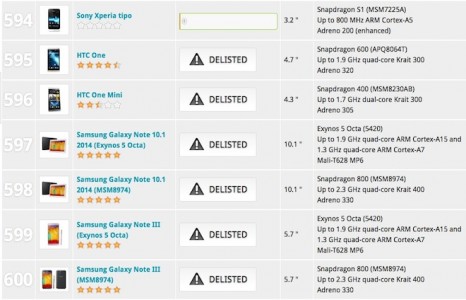Luna trecuta s-a descoperit ca Samsung, HTC si alti producatori de terminale mobile falsifica rezultatele benchmark-urilor pentru smartphone-uri, modificand sistemul de operare pentru a detecta o aplicatie de benchmark si a creste frecventele CPU/GPU-ului la valori mai mari decat cele normale. Acest lucru genereaza impresia ca terminalele sunt foarte puternice, insa ele functioneaza la frecvente mai mari decat cele obisnuite, deci rezultatele sunt mincinoase, iar cei de la Futuremark au decis sa elimine scorurile inregistrate de catre unele terminale Samsung si HTC in benchmark-ul 3D Mark.
People rely on Futuremark benchmarks to produce accurate and unbiased results. That’s why we have clear rules for hardware manufacturers and software developers that specify how a platform can interact with our benchmark software. In simple terms, a device must run our benchmarks without modification as if they were any other application. The platform may not detect the launch of the benchmark executable. The platform must not alter, replace or override any parameters or parts of the test, nor modify the usual functioning of the platform based on the detection of the benchmark.
Suspectand cei doi producatori de alterarea scorurilor benchmark-urilor, Futuremark a luat preveniv decizia de a scoate din listele sale scorurile inregistrate pentru doua smartphone-uri si tablete Samsung, plus inca doua smartphone-uri HTC. Desi s-a discutat intens despre cat de gresita este aceasta strategie a producatorilor de terminale Android, se pare ca unii pur si simplu nu vor sa invete cum sa faca business corect, iar acest lucru ii va afecta pe termen lung.






















